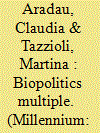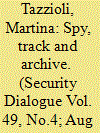|
|
|
Sort Order |
|
|
|
Items / Page
|
|
|
|
|
|
|
| Srl | Item |
| 1 |
ID:
172344


|
|
|
|
|
| Summary/Abstract |
This article proposes ‘biopolitics multiple’ as an approach to the heterogeneity of biopolitical technologies deployed to govern migration today. Building on work that has started to develop analytical vocabularies to diagnose biopolitical technologies that work neither by fostering life nor by making people die in a necropolitical sense, it conceptualises ‘extraction’ and ‘subtraction’ as two such technologies that take ‘hold’ of migrants’ lives today. Extraction, explored in the article through a focus on borderzones in Greece, captures the imbrication of biopolitics and value through the ‘outside’ creation of the economic conditions of data circulation. Subtraction, which is analysed in this article through a focus on Calais, captures the practices of (partial) non-governing by taking material and legal terrain away from migrants and reconfiguring convoluted geographies of (forced) hyper-mobility. This move allows us to understand the governmentality of migration beyond binary oppositions such as ‘making live/letting die’, biopolitics/necropolitics and inclusion/exclusion.
|
|
|
|
|
|
|
|
|
|
|
|
|
|
|
|
| 2 |
ID:
152732


|
|
|
|
|
| Summary/Abstract |
This article engages in an experiment that aims to push critical/post-structuralist thought beyond its comfort zone. Despite its commitment to critiquing modern, liberal ontologies, the article claims that these same ontologies are often tacitly reproduced, resulting in a failure to grasp contemporary structures and histories of violence and domination. The article brings into conversation five selected critical scholars from a range of theoretical approaches and disciplines who explore the potential of the notion of “fracture” for that purpose. The conversation revolves around political struggles at various sites—migrant struggles in Europe, decolonial struggles in Mexico, workers and peasant struggles in Colombia—in order to pinpoint how these struggles “fracture” or “crack” modern political frames in ways that neither reproduce them, nor lead to mere moments of disruption in otherwise smoothly functioning governmental regimes. Nor does such “fracturing” entail the constructing of a “complete” or “coherent” vision of a politics to come. Instead, we detail the incoherent, tentative, and multiple character of frames and practices of thought in struggle that nevertheless produce an (albeit open and contested) “whole.”
|
|
|
|
|
|
|
|
|
|
|
|
|
|
|
|
| 3 |
ID:
184312


|
|
|
|
|
| Summary/Abstract |
This paper deals with data extraction and data circulation that are at stake in refugee governmentality with a focus on the Cash Assistance Programme in Greece. It focuses on the data extraction activities which are part of the cash Assistance Programme and on the ways in which data is shared and not shared among the actors involved. It starts by critically engaging with debates on techno-humanitarianism in refugee governmentality, and it moves on by drawing attention to the constitutive dynamics between data abundance and data disregard. Then, it analyses the extent to which different actors can access and act upon the data. The second part of the article centres on the peculiar modes of subjectivation that asylum seekers are shaped by, as cards beneficiaries and techno-users. It shows that asylum seekers are both passive surfaces of data extraction and, at the same time, are object of a request to speak and to produce data and feedback about their use of the card. The paper concludes with a section about the injunction imposed on asylum seekers to act as autonomous and responsible techno-users and, at the same time, to comply with multiple spatial restrictions.
|
|
|
|
|
|
|
|
|
|
|
|
|
|
|
|
| 4 |
ID:
185786


|
|
|
|
|
| Summary/Abstract |
This article investigates the fragmented knowledges that migrants need to deal with in order to get access to asylum, and the related effects of disorientation it generates on them. The piece argues that disorientation is as a constitutive political technology of refugee governance and develops this argument by focusing on the Greek asylum system. It starts by drawing attention to the multiple technological steps and forced digital intermediations that asylum seekers in Greece need to navigate, focusing in particular on the Cash Assistance Programme, and it shows how asylum seekers need to deal with dispersed knowledges. The article moves on by analysing how the governing through disorientation underpin the asylum legal system in Greece and how this ends up in debilitating asylum seekers and hampering them from accessing rights and humanitarian support. The final section explores how asylum seekers are racialised and treated as deceitful subjects, and argues that not only their speech but also their conduct and behaviour are assumed to be deceptive, and therefore their knowledge turns out to be pointless. It concludes by challenging claims for more transparency and more knowledge as a response to the governing through disorientation.
|
|
|
|
|
|
|
|
|
|
|
|
|
|
|
|
| 5 |
ID:
169948


|
|
|
|
|
| Summary/Abstract |
This paper focuses on the financialization of refugee humanitarianism in Greece, bringing attention to the Cash Assistance Programme, which is the first European Union–funded project in Europe providing financial support to asylum seekers, coordinated by the United Nations High Commissioner for Refugees. This program consists of the delivery and monthly recharge of prepaid debit cards to asylum seekers inside hotspots and refugee camps. The article deals with three aspects. First, it analyzes the political technologies of government that this system enforces, bringing attention to the modes for governing refugee populations in transit. Second, it considers the data circulation activities that are connected to it, analyzing what I call the circuits of financial humanitarianism and explaining in detail how data is shared between the different actors involved (banks, IGOs, Greek authorities, and NGOs). Third, it explores the specific effects of subjectivation produced by this temporary and exclusionary mechanism of financial support, together with the forms of value extraction that stem from it. The paper argues that far from generating financial inclusion, techniques of financialization of humanitarianism should be situated among measures for regaining control over unruly movements, predicated upon exclusionary and temporary mechanisms of government.
|
|
|
|
|
|
|
|
|
|
|
|
|
|
|
|
| 6 |
ID:
160450


|
|
|
|
|
| Summary/Abstract |
This article focuses on the temporalities of visibility that are at stake in the functioning of two mapping monitoring softwares devised by Frontex: Eurosur and Jora. Through a study of border practices and security devices that builds on interviews and direct observation, the article shows that while these two systems elaborate on data and information collected in real time, they work as archives for generating future migration risk scenarios and not for border surveillance purposes. After illustrating in detail the functioning and modes of visualization of Jora and Eurosur, the article takes into account how police officers, Frontex and navies use these devices, and how risk analyses are produced. The article demonstrates that these monitoring mapping devices are sustained by coeval temporalities: the detection of migrants ‘on the spot’ coexists with both a future-oriented temporality and an archival one. The second part of the article analyses the impact that mapping monitoring softwares have on migrant journeys and migrant lives. The article concludes by bringing attention to the ways in which migrants in part strategically appropriate and twist the temporality of security and the field of visibility enacted by these devices.
|
|
|
|
|
|
|
|
|
|
|
|
|
|
|
|
| 7 |
ID:
185633


|
|
|
|
|
| Summary/Abstract |
This article deals with the technologies and apps that asylum seekers need to navigate as forced hindered techno-users in order to get access to asylum and financial support. With a focus on the Greek refugee system, it discusses the multiple technological intermediations that asylum seekers face when dealing with the cash assistance programme and how asylum seekers are obstructed in accessing asylum and financial support. It explores the widespread disorientation that asylum seekers experience as they navigate un-legible techno-scripts that change over time. The article critically engages with the literature on the securitization and victimization of refugees, and it argues that asylum seekers are not treated exclusively as potential threats or as victims, but also as forced hindered subjects; that is, they are kept in a condition of protracted uncertainty during which they must find out the multiple technological and bureaucratic steps they are requested to comply with. In the final section, the article illustrates how forced technological mediations actually reinforce asylum seekers’ dependence on humanitarian actors and enhance socio-legal precarity.
|
|
|
|
|
|
|
|
|
|
|
|
|
|
|
|
|
|
|
|
|